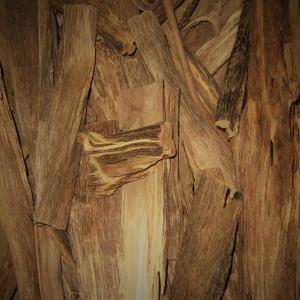

Oud oil has been inspiring devotees of rare fragrances for millennia. It is mentioned in the Bible, in the Quran and even in the 5,000-year-old Sanskrit Bahagavata Purana.
And from Tom Ford to Armani, oud is still in huge demand today.
Unfortunately, the resin, produced naturally by Agarwood trees as a defence mechanism to infection from bacteria, is becoming increasingly difficult to source.
In fact stocks are dwindling so dramatically that they are now protected by rare species CITES international legislation.
Furthermore, in the wild, they are vulnerable to unscrupulous ‘harvesters’ who illegally cut out infected pieces of wood, irreparably damaging the trees in the process.
Meanwhile, in plantations, economically challenged farmers have either been anxiously depleting their tree stocks for a quick return or finding themselves with worthless Agarwood because they do not have the expertise for a successful artificial ‘infections’.
The result? Liquid gold. Oud is now, pound for pound, as valuable as the precious metal. Depending on the quality, the wholesale price is US$15,000 a litre. The retail value can see these prices triple.
Enter the Thailand-based company Asia Forestry, which director Andy Steel, plans to grow to “be the largest producer of oud oil in South East Asia by 2013”.
The company has more than 200,000 trees in 60 plantations covering about 300 acres all managed in line with Forest Stewardship Council principles.
Asia Forestry also owns an ISO-9001 accredited factory, the second largest in Thailand, for refining the oil and ensuring it meets internationally recognised standards.
And this is all very well and good, but the company has also been working with local farming communities in Thailand to create partnerships that are lucrative for everyone.
“These farmers found themselves with Agarwood trees that were worth only firewood prices because only a small percentage were infected naturally,” says Steel. “For the farmers there is a labour cost that comes with cutting down the trees and firewood is only worth about US$15 a ton.”
As a result Asia Forestry went into partnership with these communities, leasing the land on which the trees are growing, introducing the processes that encourage the growth of resinous wood and also buying the trees from the farmers at a fair market price.
Strictly monitored distillation processes ensure that the final oil meets clients’ requirements and the company is working on developing international standards to protect sellers.
“It is a win-win situation,” says Steel. “As firewood, the trees were worth less than a dollar each and farmers could not afford the technology to infect the trees themselves. Now the communities benefit from two sources of income: the tree sale and lease.”
Plans are now underway to establish an association of oud farmers, says Steel.
“It is important that we share our forestry knowledge and mentor the communities in the creation of their own plantations and that farmers are incentivised to look after the trees and harvest them sustainably,” he says.
“We have also taught villagers how to collect seeds from plantations and forests and we buy these from them for our own nurseries. The growing of trees is one of the most sustainable things you can do. But this is also good business for everyone, the growth potential in the future will be significant… in every sense.”
